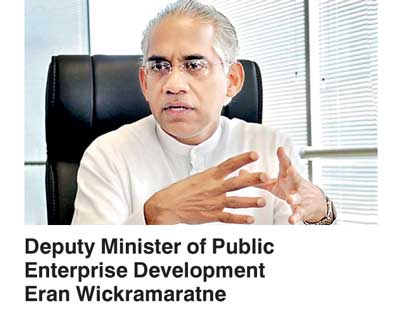Tuesday Feb 17, 2026
Tuesday Feb 17, 2026
Wednesday, 14 December 2016 00:01 - - {{hitsCtrl.values.hits}}
 Deputy Minister of Public Enterprise Development Eran Wickramaratne made a passionate plea to lawmakers from across the board to work together to adopt an e-procurement system for the country that would help save billions of rupees that are lost due to corruption each year.
Deputy Minister of Public Enterprise Development Eran Wickramaratne made a passionate plea to lawmakers from across the board to work together to adopt an e-procurement system for the country that would help save billions of rupees that are lost due to corruption each year.
“In 2015, Government procurement amounted to Rs. 600 billion. If we can reduce waste by 1% of this amount we can save Rs. 600 million and if we reduce this by 5% we will have enough to increase by twice the amount allocated to the education sector in the country annually,” he said, speaking during the Committee Stage debate of the Ministry of Finance in Parliament on Saturday.
The Deputy Minister’s plea for more transparency in the public procurement system comes days after President Maithripala Sirisena acknowledged, during his address to an anti-corruption conference in Colombo, that half of the country’s public procurement contracts were tainted with bribery and corruption. It’s the first official acknowledgement of how widespread corruption is in the country’s State sector procurement system.
Wickramaratne said Sri Lanka needed to move towards a Common Centralized Electronic Platform (CCEP) as had been done by countries liked Bangladesh, India and Mexico.
“The reason to bring in e-procurement is to provide information on tenders, on plans, on circulars. It brings transaction costs down. There is no cost of travel and both private costs as well as public costs come down. It also increases competition in the market and that’s why you need it,” he said.
The Deputy Minister said that with the use of the CCEP in Bangladesh, procurement processing time has been reduced from 51 days to 21 days. In India it has come down from 90 -135 days to 35 days while in Sri Lanka the process takes at least one and half years. He said that just by streamlining the process South Korea had saved $ 1.4 billion between 2001 and 2015
“From tender notice to award we can have one system. Then contracts will increase and small and medium businesses can come into this. It’s a question of giving all the information to the public. This is a nationally important thing,” the Deputy Minister noted.
Wickramaratne said that with the passage of the 19th Amendment to the Constitution, a new Independent Commission called the National Procurement Commission was set up with the intention of wiping out bribery and corrupt in the procurement system.
“We have a commission but the commission alone cannot do this. We need to create an agency for the whole of the Government under the Commission with a common platform,” he said.
The United National Commission against Corruption has in a report said that public procurement is the area in which most corruption takes place in countries.
The Deputy Minister appealed to the Opposition to support the Government’s endeavour to move towards an e-procurement system. “The Opposition should be constructive in its criticism. We know corruption was high during the previous regime. We are changing that. Even for recruitment to the Bank of Ceylon (BOC) and the People’s Bank, we are asking people to apply across the electronic medium because we want to reduce human intervention,” he added.
Sri Lanka signed and ratified the UN Convention against Corruption in March 2004 but is yet to enact substantial legislation to give legal effect to its contents.